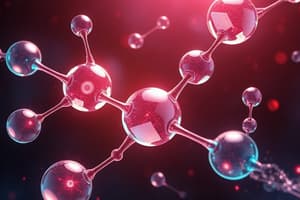Podcast
Questions and Answers
Which type of molecule has a straight shape?
Which type of molecule has a straight shape?
- Linear molecules (correct)
- Tetratomic molecules
- Angular molecules
- Triatomic molecules
What is the main difference between atoms and molecules?
What is the main difference between atoms and molecules?
- Atoms are not bonded together, while molecules are bonded together. (correct)
- Atoms exist independently, while molecules cannot exist independently.
- Atoms are made up of protons, neutrons, and electrons, while molecules are made up of only protons and electrons.
- Atoms are the basic building blocks of elements, while molecules are the basic building blocks of compounds.
Which statement about polymolecules is correct?
Which statement about polymolecules is correct?
- Polymolecules are always linear in shape.
- Polymolecules are made up of atoms of different elements.
- Polymolecules are made up of several atoms of different elements.
- Polymolecules are made up of several atoms of the same element. (correct)
What category do molecules with four atoms belong to?
What category do molecules with four atoms belong to?
What is the fundamental difference between atoms and molecules?
What is the fundamental difference between atoms and molecules?
Which type of atoms are considered stable?
Which type of atoms are considered stable?
What is the main difference between homomolecules and heteromolecules?
What is the main difference between homomolecules and heteromolecules?
What is the primary role of neutrons in an atom?
What is the primary role of neutrons in an atom?
Flashcards
What are atoms?
What are atoms?
Atoms are the smallest units of matter that can exist independently. They are the building blocks of elements.
What are the three main types of particles found in an atom?
What are the three main types of particles found in an atom?
The three main types of particles in an atom are protons (positively charged), neutrons (neutral), and electrons (negatively charged).
What makes an atom stable?
What makes an atom stable?
An atom is stable when it has an equal number of protons and electrons. This means it has a balanced charge.
What are molecules?
What are molecules?
Signup and view all the flashcards
Explain the difference between homomolecules and heteromolecules.
Explain the difference between homomolecules and heteromolecules.
Signup and view all the flashcards
What is a linear molecule?
What is a linear molecule?
Signup and view all the flashcards
What is an angular molecule?
What is an angular molecule?
Signup and view all the flashcards
What is the key difference between atoms and molecules?
What is the key difference between atoms and molecules?
Signup and view all the flashcards
Study Notes
Atom and Molecules
Introduction
Atoms and molecules are fundamental units of matter and are essential to understand the properties and behavior of substances. Atoms are the basic building blocks of elements, while molecules are formed when atoms of one or more elements bond together. In this article, we will discuss the structure of atoms, types of atoms, types of molecules, and the difference between them.
Atoms
Atoms are the smallest units of matter that are capable of independent existence and can only be divided in whole number of particles. There are three main types of atoms:
- Protons: Positively charged particles, found in the nucleus of an atom.
- Neutrons: Neutral particles, also found in the nucleus of an atom.
- Electrons: Negatively charged particles that orbit the nucleus of an atom.
Types of Atoms
Atoms can be categorized into two types based on their structure:
-
Unstable Atoms: Atoms that have a different number of protons and electrons can be unstable due to the excess or deficit of electrons.
-
Stable Atoms: Atoms that have an equal number of electrons and protons are stable, meaning they cannot be further broken down.
Molecules
Molecules are formed when atoms of one or more elements bond together through a process called chemical bonding. There are three main types of molecules:
- Homomolecules: Molecules made up of the same type of atoms.
- Heteromolecules: Molecules made up of different types of atoms.
- Polymolecules: Molecules made up of several atoms of the same element.
Types of Molecules
Molecules can be categorized into four main types based on their shape:
- Linear molecules: Molecules with a straight shape, such as CO and N2.
- Angular molecules: Molecules with an angular shape, such as BF3 and SO2.
- Triatomic molecules: Molecules with three atoms, such as CO2 and H2O.
- Tetratomic molecules: Molecules with four atoms, such as CH4.
Difference between Atoms and Molecules
The main difference between atoms and molecules lies in their structure and composition:
- Atoms: Atoms are the basic building blocks of elements, made up of protons, neutrons, and electrons.
- Molecules: Molecules are formed when atoms of one or more elements bond together, resulting in a larger unit.
Conclusion
Atoms and molecules are fundamental units of matter that play a crucial role in understanding the properties and behavior of substances. By understanding their structure, types, and differences, we can gain a deeper insight into the world around us.
Studying That Suits You
Use AI to generate personalized quizzes and flashcards to suit your learning preferences.




